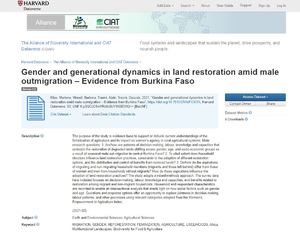Gender and generational dynamics in land restoration amid male outmigration – Evidence from Burkina Faso
The purpose of the study is evidence base to support or debunk current understandings of the feminization of agriculture and its impact on women’s agency in rural agricultural systems. Main research questions: 1. Are/how are patterns of decision-making, labour, knowledge and capacities that underpin the restoration of degraded lands shifting across gender, age, and socio-economic groups as a result of seasonal male out-migration in central Burkina Faso? 2. To what extent does household structure influence land restoration practices, constraints to the adoption of different restoration options, and the distribution and control of benefits from restored lands? 3. Do/how do the aspirations of migrating and non-migrating household members (migrants and those left behind) differ from those of women and men from households without migrants? How do these aspirations influence the adoption of land restoration practices? The study adopts a mixed-methods approach. The survey data here included focuses on decision-making, labour, knowledge and capacities, and benefits related to restoration among migrant and non-migrant households. Household and respondent characteristics are recorded to enable an intersectional analysis that sheds light on how social factors such as gender and age. Questions and response options offer an opportunity to explore jointness in decision-making, labour patterns, and other processes using relevant categories adopted from the Women’s Empowerment in Agriculture Index.

